
PERFECOAT
High Performance Bio-based Functional Coatings for Wood and Decorative Applications

High Performance Bio-based Functional Coatings for Wood and Decorative Applications
The pursuit of a climate-neutral Europe and a truly circular economy requires attention to virtually all fields of production if fossil-based materials are to be eliminated. This relates not only to manufactured goods but also the paints and coatings used to protect them; of the almost 1 million tonnes of paints and coating produced in Europe each year, more than 80% are derived from fossil resources. Even those coatings than do rely on bio-based compounds often have CO2 footprints little different from the existing coatings. Reducing the impact of these coatings this would represent a major advance in Europe’s climate ambitions. Therefore, to address this challenge, the PERFECOAT project will develop and validate a new generation of industrial wood and decorative coatings with significantly more than 25% bio-based components. The project will address three important markets for coatings, high-volume, UV-curable clear coatings, waterborne trim paints for DIY and waterborne wall paints. These coatings will reach, and even surpass, the current quality and sustainability standards.
When successful, the PERFECOAT project will be able to offer bio-based coating ingredients from climate neutral sources and processes. This will help encourage the uptake of sustainable coatings, with a positive impact for the environment and helping prevent climate change.
The overarching objective of the PERFECOAT project is to develop novel sustainable coatings that will ultimately be available to the public, through their application on high-volume production home and office furniture and as DIY paints. Within this, the project will pursue a number of specific objectives.
In addition, the project will enhance European leadership in the biotechnology sector and strengthen the EU’s leadership in adopting renewables
The PERFECOAT project is aimed at delivering a number of impacts that will contribute to the wider goals of the BBI-JU. These will include: